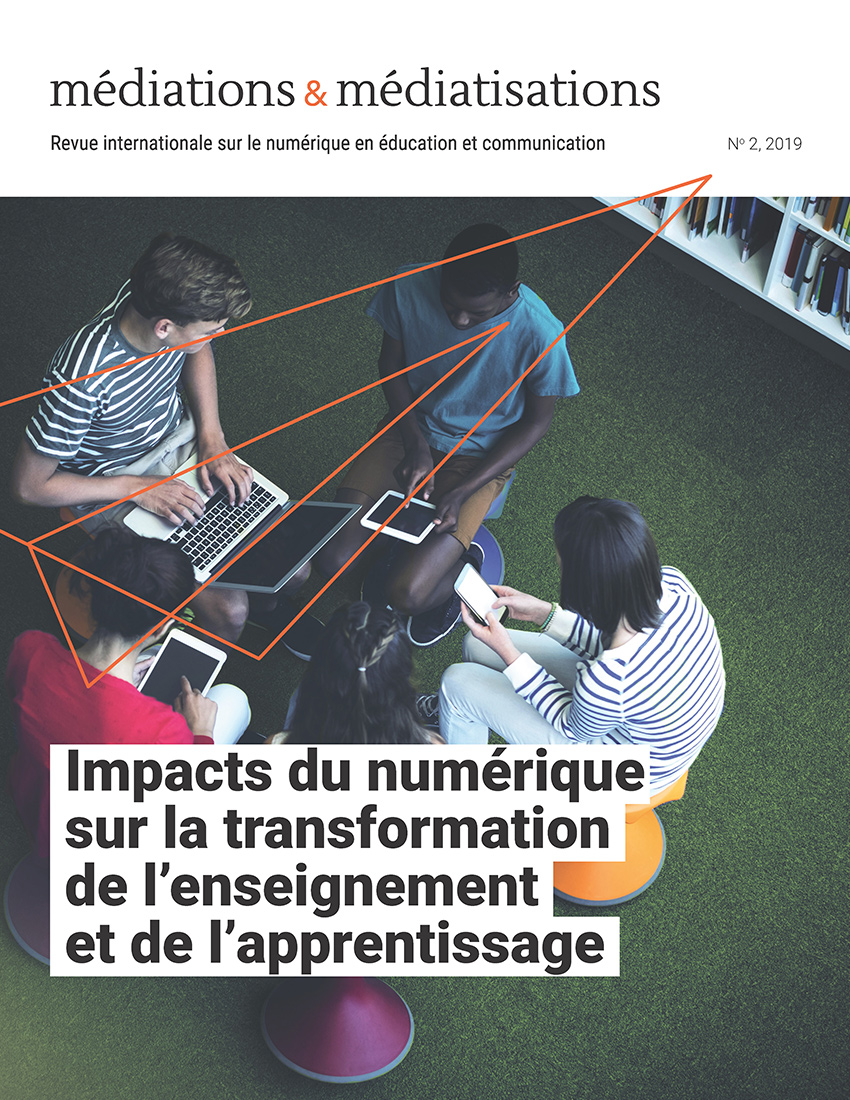Sharing contextual knowledge information via asynchronous distance learning: Insights from a context-based research project in primary schools
##plugins.themes.bootstrap3.article.main##
Resumo
This paper expands on the effective implementation of collaboration platforms for research purposes in primary education settings. In our study, Edmodo has been introduced as a medium for facilitating the asynchronous discourse between learners of Guadeloupe and Quebec. The following analysis is based on the digital traces derived from the online activity of users working on two different disciplinary research projects: one in linguistics and one in education for sustainable development (ESD). In essence, this paper covers the procedure of introducing a collaborative tool for educational purposes to an audience with diverse expertise in understanding and using it. In addition, it provides a conceptual analysis for understanding the online messages exchanged during these context-related interactions.
Downloads
##plugins.themes.bootstrap3.article.details##

Este trabalho encontra-se publicado com a Licença Internacional Creative Commons Atribuição-NãoComercial-CompartilhaIgual 4.0.
Referências
Adam, F. & Westlund, H. (2013). Innovation in socio-cultural context. New York: Routledge. Bales, R. F. (1950). Interaction Process Analysis. Cambridge. MA: Addison-Wesley.
Chou, C. C. (2002). A Comparative Content Analysis of Student Interaction in Synchronous and Asynchronous Learning Networks. Proceedings of the 35th Annual Hawaii International Conference on System Sciences, https://doi.org/10.1109/hicss.2002.994093
Corno, L. & Mandinach, E.B. (1983, 06). The role of cognitive engagement in classroom learning and motivation. Educational Psychologist, 18(2), 88-108. https://doi.org/10.1080/00461528309529266
Davis, F. D., Bagozzi, R. P. & Warshaw, P. R. (1989). User Acceptance of Computer Technology: A Comparison of Two Theoretical Models. Management Science, 35(8), 982–1003. https://doi.org/10.1287/mnsc.35.8.982
Depover, C. (2014). Quels modèles économiques et pédagogiques pour les MOOC? Distances et médiations des savoirs. Distance and Mediation of Knowledge, 2(5).
Dillenbourg, P. (1999). What do you mean by collaborative learning? In: P. Dillenbourg, (ed.), Collaborative Learning: Cognitive and Computational Approaches (p. 1-19). Oxford: Elsevier.
Erlin, B., Yusof, N. & Rahman, A.A. (2008). Integrating Content Analysis and Social Network Analysis for analyzing Asynchronous Discussion Forum. Presented at the 2008 International Symposium on Information Technology, IEEE. https://doi.org/10.1109/itsim.2008.4631996
Forissier, T., Bourdeau, J. & Psyché, V. (2018). Quand les contextes se comparent et se parlent. Contextes et Didactiques, 10, 111-122.
Garrison, D. R., Anderson, T. & Archer, W. (1999). Critical Inquiry in a Text-Based Environment: Computer Conferencing in Higher Education. The Internet and Higher Education, 2(2-3), 87–105. https://doi.org/10.1016/S1096-7516(00)00016-6
Garrison, D. R. & Anderson, T. (2003). E-Learning in the 21st century: A framework for research and practice. London: Routledge/Falmer. https://doi.org/10.4324/9780203166093
Garrison, D. R. & Arbaugh, J. (2007). Researching the community of inquiry framework: Review, issues, and future directions. The Internet and Higher Education, 10(3), 157-172. https://doi.org/10.1016/j.iheduc.2007.04.001
Harasim, L. M. (1989). Online education: A new domain. In R. Mason & A. Kaye (Eds.), Mindweave: Communication, computers and distance education (p. 50-62). New York: Pergamon Press.
Henri, F. (1992). Computer conferencing and content analysis. In A.R. Kaye (Ed.), Collaborative learning through computer conferencing: The Najaden papers (p. 115-136). New York: Springer.
Herrington, J. A. (1997). Authentic learning in interactive multimedia environments. http://ro.ecu.edu.au/theses/1478
Lawson, H. A. (2004). The logic of collaboration in education and the human services. Journal of Interprofessional Care, 18(3), 225–237. https://doi.org/10.1080/13561820410001731278
Marimuthu, R., Chone, L. S., Heng, L. T., Terng, H. F. & Nah, E. A. (2015). Creating a Community of Inquiry (CoI) through Edmodo. eProceeding UPALS Language Colloquium 2015. https://doi.org/10.13140/RG.2.1.3064.0400
Moore, M. G. (1989). Editorial: Three types of interaction. American Journal of Distance Education, 3(2), 1-7. https://doi.org/10.1080/08923648909526659
P21 foundation (network of Battelle for Kids), (2007). Framework for 21st Century Learning. Washington DC, Partnership for 21st Century Learning. http://www.battelleforkids.org/networks/p21/frameworks-resources
Roschelle, J. & Teasley, S. D. (1995). The Construction of Shared Knowledge in Collaborative Problem Solving. Computer Supported Collaborative Learning (p. 69–97). Springer Berlin Heidelberg. https://doi.org/10.1007/978-3-642-85098-1_5
Siemens, G. (2004). Connectivism: A Learning Theory for the Digital Age. elearnspace. https://web.archive.org/web/20180706092208/http://www.elearnspace.org/Articles/connectivism.htm
Swan, K., Shea, P., Richardson, J., Ice, P., Garrison, D. R., Cleveland-Innes, M. & Arbaugh, J. B. (2008). Validating a measurement tool of presence in online communities of inquiry. E-mentor, 2(24), 1-12.
Swan, K., Garrison, D. R. & Richardson, J. C. (2009). A constructivist approach to online learning: the Community of Inquiry framework. In Payne, C. R. (Ed.) Information Technology and Constructivism in Higher Education: Progressive Learning Frameworks. (p. 43-57), Hershey, PA: IGI Global.
Vuopala, E., Hyvönen, P. & Järvelä, S. (2015). Interaction forms in successful collaborative learning in virtual learning environments. Active Learning in Higher Education, 17(1), 25–38. https://doi.org/10.1177/1469787415616730
Vygotsky, L. S. (1978). Mind in society: The development of higher psychological processes. Cambridge, MA: Harvard University Press.
Wang, Q. & Woo, H. L. (2007). Comparing asynchronous online discussions and face-to-face discussions in a classroom setting. British Journal of Educational Technology, 38(2), 272–286. https://doi.org/10.1111/j.1467-8535.2006.00621.x

